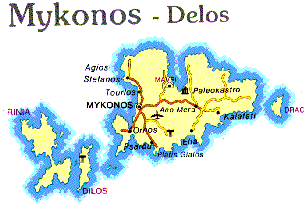History of Apollo
(According to Greek Mythology)
Apollo, god of the sun, and Artemis, goddess of the moon, were the twins of Leto and Zeus. Many qualities were attributed to Apollo, for the Ancient Greeks believed that the sun not only gave physical light, but that its light was symbolic of mental illumination. Apollo was also worshipped as the god of music and song, which the ancients believed were only heard where there was light and security. Artemis was worshipped as the goddess of childbirth and protector of children; yet, paradoxically, she asked Zeus if he would grant her eternal virginity. She was also the protector of suckling animals, but loved to hunt stags!

Birthplace of Apollo
Despite its diminutive size, Delos is one of the most important archaeological sites in Greece, and certainly the most important in the Cyclades. Delos was a place of such importance that the surrounding islands were known as the Cyclades, since it was thought that they lay in a circle round the island on which the god Apollo was born.
History of Delos
According to mythology, Leto, pursued by Hera, found refuge on a floating rocky island, which Poseidon then anchored to the sea bottom with pillars of granite. Here, under the palm, she bore to Zeus the twins Apollo and Artemis, attended by Arge and Opis, two maidens from the hyperborean regions of the north, which god was required to visit annually.
Towards the end of the 3rd millennium BC this earlier population established a settlement on the hill of Kinthos, followed in the 2nd millennium by another settlement in the area of the later Sacred Precinct.
From the 7th century BC, Delos was under the influence of Naxos, which promoted the development of the sanctuary. In the 6th century BC, Peisistratos carried out a "purification" of the island, with the removal of all tombs (apart from the two hyperborean maidens) from Delos to the neighboring island of Rheneia. Athenians coveted Delos for a long time, seeing its strategic position as one from where they could control the Aegean, and by the 5th century it had come under their jurisdiction.
At that time, Delos became the headquarters of the Delian Confederacy, a maritime league under the leadership of Athens, but in 454 BC the Athenians carried off the treasury of the league and deposited it on the Acropolis. In 314 BC Delos broke away from Athens to become independent and therefore enjoyed a period of great prosperity. The island reached its height in Hellenistic times, becoming one of the 3 most important religious centers in Greece and a flourishing center of commerce. It traded through the Mediterranean and was populated with wealthy merchants, mariners and bankers from as far away as Egypt and Syria. These inhabitants built temples to the various gods worshipped in their countries of origin, although Apollo remained the principal deity worshipped on the island.
In 166 BC the Romans declared Delos a free port, which promoted its development as a trading center - dealing, among other things, in slaves - and led to the growth of a considerable commercial town. In 88 BC it was sacked by Mithridates and 10.000 inhabitants were massacred. From then on, Delos was prey to pirates, and later, also to looters of antiquities.
According to mythology, Aristeus arrived in Kea about the 16th century B.C. He was the son of God Apollo and the Nymph Kyrene. Aristeus offered great services to the island. After having exempted it from the draught, he organized cattle raising and taught the inhabitants the method of apiculture, olive processing and the like. For all that he was honored as a god and received the name Aristeus Apollo.
Copyright 1994 - 1997 Plus Network Services S.A. [email protected]